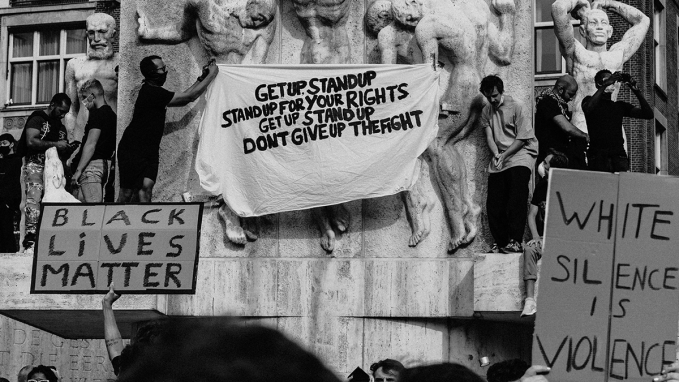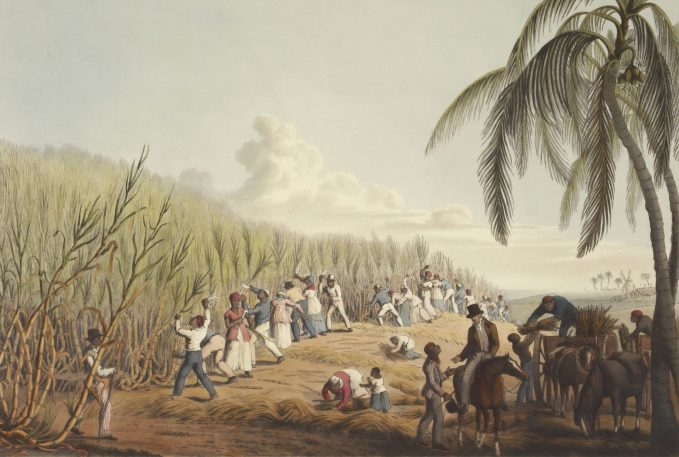When celebrating a country becomes a problem, Part 2: the 4th of July and Black Lives Matter

Read the first part here: When celebrating a country becomes a problem, Part 1: Australia Day and the Indigenous Peoples
If the cohabitation of different ethnic groups in the same territory can problematise the celebration of a country, racism, and the political context also factor as tensions on a national day.
Like you have read in the previous article, national days are important because they represent the celebration of a country as a single entity, with all the citizens coming together to appreciate what they have. For Australia, the controversy surrounding its national day comes from the meaning of this date (the day when the First British Fleet arrived on the continent) and the fact that, for the Indigenous Peoples, it represents the day the invasion of their land started. It is strongly linked to the country’s history.
However, history isn’t the only reason why a national day can be problematic. In the United States, the national day doesn’t commemorate the day on which the British arrived and colonised the land at the cost of the Native Americans. Just like the Indigenous people in Australia, the Native Americans were brutalized and slaughtered by people, who came to take a continent they had been living on for a very long time.
In the United States, the controversy about the celebration of the 4th of July isn’t totally new, but found a new voice last year in the wake of the Black Lives Matter movement. Covid itself would have troubled this festive day in America, but it went further: after months of protests against police violence and institutional racism against African American people, the national day didn’t celebrate unity at all.
What is the 4th of July? A bit of history
Even if the controversy only broke out in 2020, it seems necessary to review the history and see what the 4th of July stands for. We find that it’s very different from the case of Australia Day. If Australia celebrates the day the British invaded the island-continent, Americans celebrate the day they got rid of the British. The date is a symbol, because historically the United States won their independence at the end of the Revolutionary War in 1783, but the 4th of July was still an important day in the country’s history.
Officially, the 4th of July marks the day on which the Continental Congress adopted the Declaration of Independence in 1776. Meeting at the Pennsylvania State House (then renamed Independence Hall) in Philadelphia, this Congress was composed of representatives of the thirteen American colonies who assembled to debate the revolutionary sentiment that was growing in the society after the publication of Thomas Paine’s pamphlet, Common Sense. The resentment that Americans had towards the British Empire was latent after years of taxes and a lack of representation.

With the Congress starting on 7 June 1776, the idea of full independence from Britain was introduced by Richard Henry Lee, a delegate from Virginia. The vote on this resolution was postponed, but a five-man committee was appointed, counting in its ranks very famous names like Thomas Jefferson (Virginia), John Adams (Massachusetts) and Benjamin Franklin (Pennsylvania). The role of this committee was to draft a statement to explain America’s will to break with Britain.
The vote on this statement, later called the Declaration of Independence, mainly written by Thomas Jefferson, and was officially adopted on the 4th. As early as 1777, the celebrations started with the first commemoration held in Philadelphia, when the war was still on-going. It became an official federal holiday in 1870.
What does it mean to African Americans?
If you take a close look at the origins of American democracy, a few things strike you. Among those, you remark quickly that all the people involved in the independence movement were white men; and the most famous of them, like George Washington or Thomas Jefferson, were slave owners. It tells a lot about the consideration of African Americans.
In 1852, the day after the celebration of Independence Day, Frederick Douglass, an abolitionist who was born a slave before escaping, gave a speech entitled What to the Slave Is the Fourth of July? In his speech, he addresses the question of celebrating a country where a sizeable part of its population is enslaved. At this time, some human beings living in the United States were still considered property.
“What have I, or those I represent, have to do with your national independence? Are the great principles of political freedom and of natural justice, embodied in that Declaration of Independence, extended to us?” Frederick Douglass asked in his speech, enlightening the paradox of celebrating the 4th of July. “What, to the American slave, is your 4th of July? I answer a day that reveals to him, more than all other days in the year, the gross injustice and cruelty to which he is the constant victim.”

With the abolition of slavery in 1865, and the Civil Rights movement ending segregation, one may think things have definitely changed for the better. Last year’s events show us that this is not the case. African American are disproportionately mistreated in the United States, victims of police and institutional violence and racism. They are killed in greater numbers than other ethnicities and they aren’t offered the same justice as white Americans can expect. On the National Association for the Advancement of Colored People (NAACP) website, several facts show this reality, and people know about it: “84% of black adults say white people are treated better than black people by police; 63% of white adults agree based on 2019 research on police relations”.
After George Floyd was murdered by policemen on 25 May 2020, people from all around the world seemed to realise that what was happening in the United States had been happening for years. The names of several black people, victims of police brutality, became internationally known. Large protests took place in various countries, despite the Covid restrictions, asking for more justice and for the end of institutional racism in America and around the world.
- Remember Slavery – Not a Thing of the Past
- Amazing Grave: American Music – Renegades: Born in the USA
People from “the land of the free” looking for justice and freedom for everyone
Unlike Australians, Americans don’t necessarily want to change the date of their national day, but they do want to change their reality, seeking peace for a part of the population who live in fear of institutions that are supposed to protect them. Protesters, who had been marching even before July started, saw in Independence Day a way to shine a light on something important: they feel like strangers in their own country.
A speech written by Safia Elhillo, Danez Smith, Lauren Whitehead, W. Kamau Bell, Angel Nafis, Idris Goodwin, Pharoahe Monch, Camonghne Felix, Nate Marshall and delivered by Daveed Diggs in a YouTube video on the Movement For Black Lives channel speaks volumes. Almost 170 years after Frederick Douglass’s speech, we find the same ideas, sometimes even the very same words, which shows that the progress made has clearly been too slow and too little.
“What, to my people, is the Fourth of July?” Daveed Diggs, who played Thomas Jefferson in Hamilton: An American Musical, asks. His harsh tone coincides with his words and with the cruel reality of the United States today. “Help me, tell me, what do we tell the children of your Fourth of July? What is death to a daughter? What is a river to a sea? Where is the country where my people are safe?”
Delivering the speech, Daveed Diggs calls the national celebrations a “theatre of denial, a propaganda pageant”. “My uncle can’t sleep, and he was born free. And he ain’t never been.” The future is dark. The video shows, side by side, images of Independence Day celebrations and Black Lives Matter protests. All together with images of current police violence, the participation of black people in important events of American history, and events from the Civil Rights movement of the 1960s. Tears and fireworks, showing the two sides of the 4th of July.
“Every day I’m waiting for rain, some indication that this land I’m set to die on will grow good enough to deserve me. Where is it? […] How do I tell my children there is a blue sky up there? Life threw a brick through my window of opportunity. How dare I tell my children it is free?” Daveed Diggs said. The video and the speech are striking, make you shiver and reflect on a situation that some foreigners didn’t think about before 2020.
The speech’s writers wanted to tell the world that “this day should be quiet” because it means nothing for a large part of the population. Some people realised it last year, for others, it has been an underlying thought for years, even throughout their whole life. “What to us is your fourth of July? Payloads and kinks of fire, a middle finger, an ugly foil, a rain, a joke where we are the punchline. A lie, until you make it otherwise.”
Celebrating a country can easily become a problem when the date is controversial like it is in Australia, or when civil tensions and racism divide society, like in the United States. However, in the two countries, people aren’t marching for the same thing. It is difficult to believe that things can change for the better in the United States if they just change the date of their national celebration. The 4th of July symbolises the day when Americans decided to free themselves from British oppression.
If a part of the country isn’t free and is still a victim of oppression, can the date be celebrated? As the trial of former police officer Derek Chauvin for the murder of George Floyd starts today, society itself needs to change. Then, maybe, the 4th of July could mean something again. What do you think about it? Let us know your opinion on the topic in the comment section!